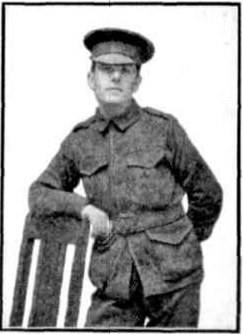Albert George Bullock
From Our Contribution
 Western Mail 1 Sep 1916 page 26. | |
| Personal Information | |
|---|---|
| Date of Birth | c1886 |
| Place of Birth | Stawell, Victoria |
| Death | 5 Jan 1938 |
| Place of Death | Murchison district |
| Age at Enlistment | 29 years old |
| Description |
5' 5½" (1.66m) tall ; 137 lbs 62.142 kg ; fresh complexion complexion ; blue eyes ; brown hair |
| Occupation | Motor driver |
| Religion | Church of England |
| Address | NOK Byford, Western Australia during 1915 |
| Next of Kin | Wife , Mrs Emma Blanche Bullock |
| Military Information | |
| Reg Number | 1407 |
| Date of Enlistment | 23 Aug 1915 |
| Rank | Lance Corporal |
| Unit/Formation | 32nd Battalion, D Company, transferred to Australian Army Motor transport Section, Chelsea. |
| Date of Embarkation | 18 Nov 1915 ‒ 18 Dec 1915 |
| Ship Embarked On | HMAT A2 Geelong |
| Date of Return | 3 Mar 1919 ‒ 10 Apr 1919 |
| Ship Returned On | HMAT A14 Euripides Portland to Fremantle |
| Fate |
Wounded in Action 19 Jul 1916 at Fromelles Returned to Australia |
| Monument | Armadale War Memorial (Beenup Panel) |
| Medals |
1914-15 Star British War Medal Victory Medal |
Pre War
NOK in Byford during 1915 before moving to 169 Charles street, West Perth, Western Australia. It is possible that Albert was also in Byford and is the H Bullock on the memorial for which a match cannot be found.
Electoral Rolls for 1910, 1912, and 1913 have Albert labouring in Goomalling; 1916 entry is for a motor driver living at 205 Charles street, Perth. In 1908 he married Emma Blanche Evenis
War Service
For the first three weeks after entering camp, Albert trained with the 25th Depot Company before becoming an original member of the 32nd Battalion, which was formed from South Australian ('A' & 'B' Companies) and Western Australian troops ('C' & 'D' Companies). After preliminary training in WA, 'C' & 'D' Companies travelled to Adelaide aboard SS Indarra in late September to join their colleagues at Cheltenham Race Course.
Albert travelled with the battalion to Egypt where they performed protective roles for Port Suez and the Canal at El Ferdan and Ismailia before moving to Tel-el-Kebir in early Feb 1916. During the last week of March they relocated to 'Ferry Post' and remain there until they moved to Moascar on 30 May 1916. On 16 Jun they entrained for Alexandria and early the next morning boarded the HMT Transylvania for France.
The Transylvania arrived at Marseilles on 23 Jun 1916. While aboard the Transylvania Albert had spent two days in the ship's hospital with influenza.
On 19 Jul 1916 he received an injury (shell wound to his left knee) when his battalion participated in the attack on German positions at Fleurbaix, part of the disastrous Battle of Fromelles. The 32nd Battalion was the left hand unit in the attack, and 'D' Company arrived in the front lines at 5.45pm, and with 'C' Company, made up the 3rd and 4th wave of attackers. The first wave attacked at 5.53pm and Albert and his group followed soon after.
Seen by the 15th Field Ambulance and the 1st Australian Casualty Clearing Station, he was admitted to 32nd Stationary Hospital on 20 Jul 1916, before being released to the 1st Convalescent Camp in Boulogne on 22 Jul 1916 where he remained until 20 Aug 1916. He rejoined the 32nd Battalion on 16 Sep 1916 and was appointed Lance Corporal on 19 September.
On 2 Nov 1916 he was admitted to the 23rd General Hospital in Étaples with Trench Feet and was sent back to England on 5 Nov 1916 aboard HMHS Newhaven from Calais. Admitted to the 1st Northern General Hospital in Newcastle on 6 Nov 1916, he was released to the 2nd Command Depot in Weymouth on 13 Feb 1917. On 17 Mar 1917 he had moved to No 3 Command Depot at Hurdcott before finally rejoining his unit in France on 1 Aug 1917 via Southampton.
Three months later he was ill and hospitalised in France before being evacuated to England again aboard HMHS Panama on 2 Jan 1918. This time via the 3rd Field Ambulance; 50th Casualty Clearing Station and 11th Stationary Hospital with I.C.T. Buttocks (Dhobi's itch). He was treated in the 1st London General Hospital before being moved to the 1st Australian Auxiliary Hospital at Harefield from 9 Jan to 9 Mar 1918.
Following treatment he enjoyed some leave in England and the normal posting to base units as his health improved before being transferred to Tidworth on 28 May 1918 and then to the Motor Transport unit at Chelsea on 10 Jul 1918.
Before going home he spent 88 ineffective days in the 1st Australian Dermatological Hospital at Bulford with Gonorrhoea (12 Jul - 7 Oct 1918). He was one of the earlier soldiers to be sent home after hostilities ceased via HMAT A14 Euripides from Portland, marked down as having flat feet. Albert was discharged by the 5th Military District on 11 Jun 1919.
Coming Home - Our Returning Heroes - The Euripides' Contingent..L/Cpl Bullock, Albert Geo, 32nd Battalion.[1]
Post War
1921 a motor driver at 34 Fairfield street Balkatta; in 1931 he was described as a depot superintendent living with Emma in Bridgetown before they return to Balcatta where between 1935 and 1937 he had become a fibrous plasterer. Seemingly turned to prospecting from 1937, dying in the Murchison district in 1938.
By 1943 Emma has returned to their Fairfield street address. Emma died on 26 Jul 1967 in Mt Hawthorn.
References
- ↑ "COMING HOME". The Daily News. XXXVIII, (13,756). Western Australia. 4 April 1919. p. 5 (THIRD EDITION). Retrieved 30 May 2017 – via National Library of Australia.